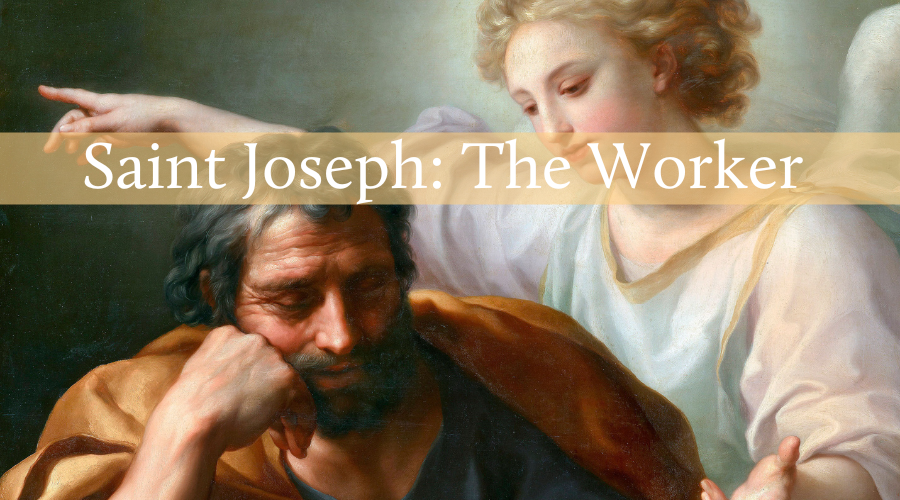
Saint Joseph The Worker
"Hard work builds character!" I heard this phrase from my father growing up as a begrudging teenager complaining about chores. I can bet that your father may have said the same at least once or twice.
At the time, the only thing I knew about "hard work" was that it kept me away from the important things I wanted to do: hours of glorious wasted time spent playing video games and having vital and deep conversations on AOL instant messenger (I know, I’m dating myself). I know now my dad was right. Hard work did more than just build character, it molded and carved me into the man I am and continues to refine me today.
Work is vital and crucial to the human condition. At the core, work is BIBLICAL. Genesis begins with the work of creation. After which, God, admiring His own work finding that:
"…it was good." (Gen. 1:25)
He then directed Adam and Eve to work in the beauty of creation and to subdue it from generation to generation.
I’ll admit, I am one of those dreaded millennials (GASP!). We get a bad rap for our misunderstanding of the true nature of hard work. In many respects, this is a fair criticism. Everything is a touch away on our phones, convenience and leisure are valued more than sacrifice and work.
Swipe and it appears at your doorstep!
There is a misunderstanding of the nature and necessity of work. What have we lost in this culture of convenience? Sacrifice – which is always connected to work and love.
On May 1st, every year we celebrate the feast of Saint Joseph THE WORKER. He was a foster-father, a worker, and quite simply THE MAN! This feast was instituted in 1955 by Pope Pius XII to uplift a vision of "worker dignity" while countering May Day protests and events sponsored by many global communist organizations. The feast as a response and counter to communism should not be ignored. The Church views work as a personal service of love and sacrifice that results in certain fruits; while in communism it is a measure of productivity for a godless state and at the same time divorces a person from the fruits of his or her labor.
Now that I am a father, I can say with certainty I had no clue what hard work truly entailed as a teenager. Fatherhood is "hard work" on steroids: it’s a never-ending adventure and lesson in self-sacrifice, a battle of willpower through challenging moments, and in others, a leaning on God’s Providence. These are the reasons God chose Saint Joseph, a man who knew the value of hard work, who could orient himself to God’s will and become the foster-father of God’s Son. To be a provider, a protector of the God-Child — he is the epitome of work that is oriented towards God and family.
Saint Joseph gives us a model of humbly and adventurously saying "yes" to God. He models a work ethic that provided for the Holy Family. Saint Joseph directly participated in the love story of God’s work to save us, and his sainthood invites us to do the same.
All work when lifted up and united to God participates in His life-giving love for us. When He created the Universe, He chose to work for six days and rest on the seventh. He didn’t have to make creation; He didn’t have to give us life; He’s totally complete and sufficient in Himself. But out of immense and unfathomable love, He poured Himself out for us — He worked, and made creation so that we could live life, discover, and have relationship with Him here on Earth and in Heaven.
The feast of Saint Joseph the Worker feast is a reminder that work matters. Work gives us purpose when oriented to the service of sacrificial love for family in a vision that is ordained by God.
We too get to experience the awesome feeling of accomplishment of the work completed by our hands and get to say "it is very good" or "job well done" or "DANG I’m good." This feast should leave us less likely to buy into corporate drives to automate every sector of our lives, and instead help us appreciate the fruits of our personal acts of labor and love while leaning on God’s vision for our lives and not our own.

